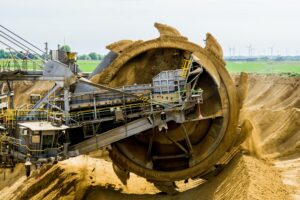Construction Engineering
Large-scale construction has many moving parts, from metal-workers to engineers to electricians. The task of overseeing and managing these crews of people to ensure a successful project falls to construction engineers. All construction engineers are civil engineers, not all civil engineers are construction engineers. Civil engineers contribute to primarily planning, design, and analysis while construction engineers focus on on-site management. They have a variety of responsibilities such as –

- Creating budgets for construction project
- Create schedules for construction projects
- Using advanced tools and machinery
- Overseeing and managing construction site safety
- Selecting equipment
- Analyzing overall and individual project progress
Environmental Engineering
Environmental engineering, like construction engineering, is a branch of the discipline civil engineering. It focuses on the environmental impacts of engineering projects on both the natural and manmade ecosystems. Things such as noise, water quality, air quality, and socioeconomic impacts as well as threatened and endangered wildlife are all factors considered by environmental engineers. Mitigation and elimination of these impacts is an environmental engineer’s main focus. Potential responsibilities of environmental engineers include but is not limited to –
- Environmental impact assessment
- Working with city, district, state, and county officials to solve environmental impact related issues
- Creating environmental impact mitigation plan
- Collecting and analyzing environmental data
- Ensuring that construction projects and designs comply with environmental and health laws
Structural Engineering
Like how the bones of the human body provide structure and support, the skeleton of buildings is responsible for the durability, stability, and strength of the structure. Structural engineers are responsible for designing these skeletons. All buildings require proper structural engineering because the safety of a structure and therefore the people they house, hinges on its skeleton. The office buildings in which people work, the houses in which they live, the swings and slides used by children would not be possible without structural engineering. Any structure being designed, repaired, or built needs a structural engineer. Other responsibilities of structural engineers can be –
- Evaluating structural integrity and determining necessary repairs
- Working with architects to design the support/load bearing skeletons for structures
- Evaluating the impact natural disasters and the elements will have on structures
For more information on structural engineering :
Structural Engineering : The Bones of Construction
Interview with Dr. Hikmat Zerbe – CIVE Head of Structural Engineering
Water Resources Engineering
Water resource engineers design water treatment plants, supply systems, as well as other equipment and facilities. It is an invaluable service that allows for the transportation and sanitation of water necessary for daily life. The clean, fresh water people drink, shower in, water their gardens, and cook with is made possible by water resource engineers. As a water resource engineer one may encounter responsibilities such as –
- Work with cities, districts, and counties to design and develop water treatment and transportation facilities
- Perform water quality analysis
- Design pump systems an pipelines
- Map out drainage systems for water flow
- Design fresh water supply systems
Geotechnical Engineering
Similar to how environmental engineers examine the environmental impact of projects, geotechnical engineers assess the impact projects may have on the ground and other natural elements. As a branch of civil engineering, geotechnical engineering includes a variety of responsibilities including –

- Analyze and determine potential geological hazards at or around build sites
- Perform subsurface investigation
- Perform field tests
- Suggest and understand design amendments based on geological analysis and evaluation
- Ensure that the project is compliant with related county, state, and federal laws
Transportation Engineering
There are many different sub-disciplines of transportation engineering. However, they all focus on the planning, design, and construction of transportation related facilities. This includes things like highway and freeway design and improvement, oil pipeline, traffic control systems, signal design, and rural road development. Transport engineers have a variety of responsibilities such as
- Suggest and design highway and freeway improvement
- Perform traffic impact analysis
- Coordinate with county, city, state, and federal government officials
- Estimate budgets
- Identify transportation and traffic issues and suggest solutions
- Oversee staking and layout of projects






